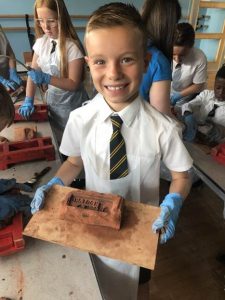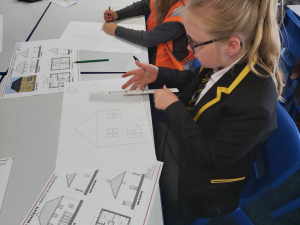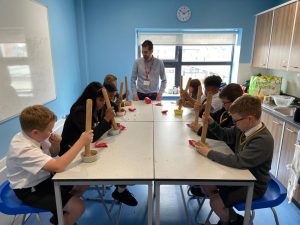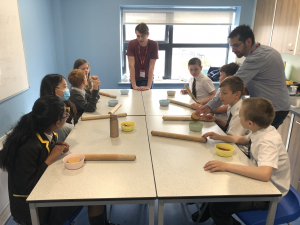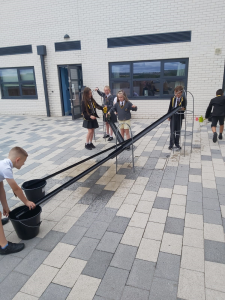Creating long-term partnerships between businesses & schools in South Yorkshire
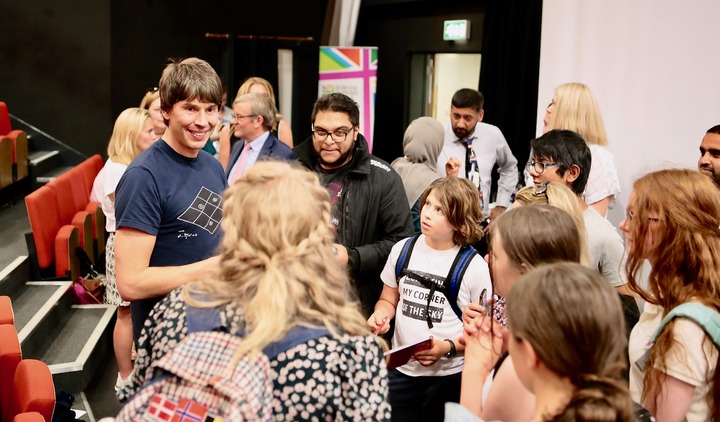
Barratt Developments, Ibstock Plc and Well North Enterprises have been working together for four years to explore how social value can be created for communities through the development of new homes. Well North are national experts in practical placemaking, with a proven track record of delivering long-term outcomes for communities. They have been sharing their methodology with these large national businesses. The partnership is focussed on turning problems into opportunities. They look for the win-wins – where community and business need align for mutual benefit.
The challenge they have chosen to collectively tackle in South Yorkshire is social mobility. Young people from communities across the UK are not fulfilling their potential. Talent is everywhere, but all too often opportunity isn’t. The futures of far too many young people in the UK are determined by background, not potential. According to Goldman Sachs, the UK has some of the lowest rates of social mobility when compared to other countries. Here’s some stark facts from the UKs Social Mobility Commission:
- Those from affluent backgrounds are 80% more likely to be in a professional job than their working-class peers – The State of the Nation Report 2018-19;
- Only 16% of young people on FSM attain at least two A-Levels by the age of 19 – The State of the Nation Report 2018 -19;
- In areas of low social mobility, it is far harder for someone from a deprived background to escape deprivation. Up to 33% of the pay gap is driven by non-educational factors – The Long Shadow of Deprivation
The housing sector offers high quality jobs and is also very accessible via vocational routes but faces significant skills challenge in relation to current and future workforce. The Meeting Housing Demand report published by the House of Lords’ Built Environment Committee in 2022 shed light of the scale of the opportunity and the challenge. The construction sector employs over 10% of the country’s workforce. In 2019, the sector contributed £117 billion to the UK economy, representing 6% of the UK’s total economic output, and accounted for 300,000 businesses, which was 13% of the UK’s total. The Government’s Employer Skills Survey in 2019 found that skills shortages accounted for 36% of all construction vacancies. This will require the sector to recruit an additional 217,000 workers, or more than 43,000 per year.
South Yorkshire is one of our key national pilot areas and over the past four years the partnership has been developing a school-based programme focussed on encouraging young people to consider future careers in construction and housing. This case study takes a look at their secondary and primary programmes and the impact they have had from the perspective of the young people, the schools and the business. The project was approached with an aim of building relationships and working deeply in a place.
The North Star Science School Partnerships
The North Star Science School was launched as a part of the Well Rotherham Project, one of the 10 pathfinders within the celebrated Well North Programme, in 2018 and has been successfully taken on and embedded in South Yorkshire by The Work-Wise Foundation. It was tasked with developing a year-round programme connecting businesses and secondary schools in the region. Creating an interface for young people with inspirational leaders from the world of Science, Technology, Education, Arts and Math (STEAM) to raise regional ambition and highlight future career opportunities.
Ibstock took part from the outset of the project and have been working in partnership with Wales High School since 2019. Barratt Development joined the programme in 2021 and have been working with Brinsworth Academy. Facilitated by the Work-Wise Foundation, the businesses work with students from their partner school on projects to co-design workshops which are delivered to year 8 and 9 students from over 70 schools form across South Yorkshire at the North Star Science School event at Gulliver’s Valley Theme Park each November.
In 2022, the Ibstock programme included visits from the school to local factories and the students and the employer worked together to develop a hands-on brick making workshop for the event. Students were also supported to achieve a STEM Ambassador award. The workshop was supported by Ibstock apprentices who also spoke to an audience of 600 at the event to share the story of their career journey. Students from Brinsworth visited the Barratt Zed House at Salford University and then designed and delivered a workshop at the North Star event with the Barratt team to showcase the latest technology available for sustainable housing. The students from Brinsworth also shared their findings with students across all year groups within the school through assemblies and classroom sessions.
The project engaged 12 Students from each school in developing and delivering the workshops. 12 Y8/9 students from each school also participated as visitors at the North Star event.
What was the impact?
This programme has had a meaningful impact on the schools and businesses. The fact that each school and business work together as long-term partners instead of in a one-off event means that the relationship builds over time and also the process and activity can continually improve and evolve over time. It develops confidence for both the businesses and the young people.
Amy, the lead teacher from Brinsworth told us that ‘visit to the Zed house was a really key moment in terms of engagement. Ayesha was fantastic and the kids just love the opportunity to learn outside of the classroom’. Brinsworth made a conscious decision to select students from across the year group who had an interest in construction instead of focussing on the highest performing. Everyone interviewed commented on the fact that they saw the students grow in confidence as the project and the workshops on the day progressed. They were given a leadership role and trusted to speak and represent a national business to their peer group. This has left a positive legacy with the students.
The learning from the event was also shared more widely within the school. In addition to the event, the students and the teacher presented their project to students from other year groups and cascaded the learning across the school. Likewise, Ayesha from Barratt has gone on to mentor students more widely from across the South Yorkshire region. The reach of the project leads into wider opportunities for social impact as people network and develop relationships which allow for new projects to emerge opportunistically.
People told us that the project has increase the confidence of students, apprentices and people within the business and all partners are keen to continue the relationship and grow the opportunity.
What learning can we take forward
The structure and format for the programme works well. It would be improved if the initial processes for securing employer sign off were speeded up to ensure that the project work in schools are not delayed. Finding the right lead in the school and the business is key for success. The quality of the projects and the confidence of those involved increases year on year as do the wider opportunities for businesses and schools to work together. This supports the decision to create long-term partnerships between schools and employers. The STEM Ambassador project that Ibstock delivered was very successful. This could be rolled out across the wider programme and awarded to all students who take part. There is an opportunity to think about how the learning from the programme is fed back up into the businesses. We see opportunities cascaded and promoted across the schools but is this process being mirrored back into the business to showcase the approach and encourage wider awareness and opportunity spotting.
Waverley Build It Green Project
Project Overview
Barratt and Ibstock worked with Well North on the Waverley Build It Green Project with Waverley Primary School in 2022. The programme was developed and facilitated by The Work-Wise Foundation and funded by South Yorkshire Housing Association as part of the Well Rotherham programme. The project aimed to introduce young people to businesses and develop an understanding of sustainability in construction. The project worked across two academic years with students in year 4 who went on into year 5.
Initially, the programme was introduced to teams at Barratt and Ibstock who worked with Work-Wise to design a series of age appropriate activities to deliver to the children. The project was launched with a ‘Drop Down Day’ where the businesses came into the schools and delivered an assembly introducing the children to sustainability in construction linked to their own community and environment. A series of interactive hands on workshops were then delivered to the Year 4 students across the day. The Year 4 students were then set a challenge and took part in a more in-depth project led by their teachers exploring what it means to build a sustainable city. With the businesses, the students looked at a wide variety of aspects of sustainability in the built environment and what goes into making those options a reality. They brought their ideas and learning together into a presentation and then built their own sustainable city our of recycled materials. This was the showcased to students and dignitaries at the North Star Science School event in November 2022.
A review assembly and presentation of Certificates was then held in school with the students in year 5 to reinforce the learning and celebrate their achievements.
The project engaged over 60 young people, alongside staff from Barratt and Ibstock from various departments.
What Worked Well?
The project was designed to be interactive and engaging for the young people by providing a ‘hands on’ approach rather than your typical employer presentation to the local community.
From a school perspective, the project really focussed on STEAM learning and gave the children an opportunity to build on their teamwork, creativity and presentation skills and become more aware of sustainability considerations in their community and daily lives.
“On a stem front many, it’s given our children a real excitement and buzz, it’s given the children skills, not only academically, but socially, to use teamwork, resilience, things that we pride ourselves on at Waverley. It’s allowed the children to look outwards within a community, and think about their impact of sustainability on others.” – April Taylor, year 2 teacher at Waverley and science and STEM lead across the trust
The school fed back that:
- It gave the young people excitement and buzz about STEAM projects
- The project ran for a prolonged period of time so prior knowledge could be built upon and applied to sessions.
- The young people gained a sense of ownership over the project.
- It gave them hands-on learning in a real-life environment.
- It gave some of the young people career aspirations inspired by the project.
From the employer’s perspective, the project was an opportunity to develop local community links and give back to the local community they were working within and develop their own teams’ skills.
The employers fed back that:
- It was a positive experience for employees to have more in-depth involvement with the local community.
- It was refreshing and thought-provoking to hear the young people’s enthusiasm and fresh perspective on some of the work they do around sustainability.
- It made the employees involved feel more ‘in touch’ with their products by participating in the project.
- It raised the profile of the businesses within the local community.
Highlights of the project were a flagship zero carbon home concept; the North Star Science School event; and the young people fed back that they particularly enjoyed the design elements of the project.
What could have been improved?
From a school perspective, the main improvement could be providing advanced notice of the project taking place. Waverley adapted aspects of their curriculum to fit with the time-scales provided, but noted that with over 12-months notice of the project taking place they would have been able to fit other subjects and topics around this projects structure in a less disjointed way.
Another improvement, that was put forward by the school and young people we interviewed, was for the children to be able to present their findings at the end of the project, potentially in the community, back to the employers or to a neighbouring school.
From the employer perspective, the project was very well run and going forward they would like the young people to be able to visit the planned Insight House, being built on Waverley in 2023, when it is completed. This will give young people the opportunity to see how some of the discussed technologies and sustainable ideas are put together in the fabric of a house rather than considering aspects individually.
What next?
We are going to apply for funding to role this project out again in the local area and use this as an opportunity to test and develop a scalable version of the programme, factoring in the improvements suggested by the project partners above.
- In 2023, Barratt Development and Ibstock Brick are building and interactive educational house at Waverley called an Insight House which will benefit the project greatly and will fulfil the employer’s suggested improvements of seeing the technologies put together in a house.
- By providing advanced notice to the schools and creating a programme that can be used yearly, we will be meeting the schools request for advance notice.
- The young people will be given an opportunity to present their findings at the North Star Science School event.
- We will look to create a digital resource that can be made available as a national educational resource available to all schools.


